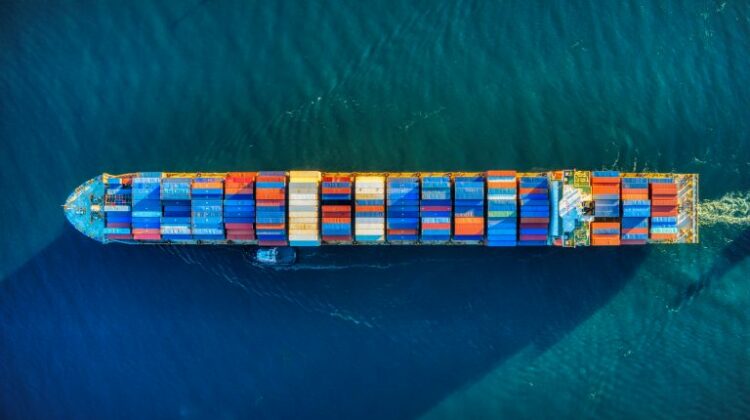
Access to preferential trade finance will require real-time ESG compliance monitoring

The maritime sector’s 3% contribution to global greenhouse emissions is always in the spotlight whenever a series of extreme weather events leads to calls for action on climate change.
As it stands, not only has the world’s shipping fleet quadrupled in size since the 1980s, but all 50,000 merchant vessels on the seas today are powered by fossil fuels. As a result, overseas manufacturing and transoceanic shipping are having detrimental consequences on our climate, as well as causing huge environmental and health problems for communities around the world.
The increasing focus on vessel emissions is why the International Maritime Organization (IMO) has agreed on mandatory steps to cut the carbon intensity by 40% by 2030, against a 2008 benchmark.
These same pressures are why banks and lenders are starting to offer preferential rates for trade transactions that are transparently greener and cleaner. Charterers and operators will have a distinct advantage, especially if they can show the vessels, fuels and routes they use are compliant with the fast-developing Environmental, Social, and Governance (ESG) standards.
The problem lies in having real-time intelligence and information about the compliance and sustainability status of a vessel and its route that banks and lenders are prepared to trust. The same is true for the environmental impact of the commodity that a vessel is transporting.
Monitoring these activities is a substantial task using conventional, manual methods. What charterers and operators need is integration of verified, trusted data into their workflows with audit trails so they can prove they are compliant and are not just claiming to be.
Nobody should be in doubt about the seriousness of emissions reductions targets around the globe. China, Japan, and South Korea are all steering their economies towards carbon-neutrality and the European Union (EU) is targeting the maritime sector with ever-tighter emissions requirements. In the United Kingdom (UK), the government is to include shipping emissions in its own carbon targets, while the Biden administration in the United States (US) has announced it will now collaborate with the IMO on carbon reduction.
Opening access to more favourable rates
If charterers and operators can prove up-to-the-minute compliance, they have a great opportunity to access the innovative trade finance programmes banks and lenders increasingly link to sustainability performance. Vessels with superior environmental ratings will earn preferential terms, while carriers with a track record of sustainability will find it easier to finance business expansion. In addition, ports will charge lower registry fees if carbon-efficiency is compliant with best practices.
The Poseidon Principles, launched in June 2019, are an attempt to deliver some of these benefits, linking ship financing with environmentally friendly behaviour and decarbonisation.
While a significant step in the right direction, they rely on annual assessments of carbon output, which omits crucial activity within that timeframe, such as choice of fuels and restoration. What carriers and charterers need is real-time, detailed information about the status of the vessel they use.
Banks should also be able to screen each commodity transaction for environmental impact across a range of real-time indicators encompassing climate effect, human exploitation, soil erosion, deforestation and water productivity. Financial institutions should have this intelligence fully integrated into their risk and compliance monitoring workflows. To be cost-effective and comprehensive, this requires an automated process that monitors emissions and sustainability right along the supply chain, using the expertise of companies that employ recognised metrics. If charterers, operators and banks can build this into their current infrastructure and systems, they will have easier access to preferential green financing and a solution that embeds sustainability in their operations long-term.
The whole maritime industry needs greater transparency so all parties can rate vessels meaningfully. That includes governments, flags and ports, commodity producers and traders as well as logistics companies, forwarders and carriers. Achieving this cost-effectively requires technology, not more manual processes. The entire maritime industry should integrate ESG monitoring into systems and workflows so it becomes more efficient and more sustainable.
Author of the article: Simon Ring, Global Head of Maritime Trade Technologies & ESG, Pole Star

Simon heads up Pole Star’s global regulatory technologies and PurpleTRAC systems, working with trade financing banks, commodity trading companies, maritime insurers, flag administrations and governments with sanctions and sustainability regulatory exposures in maritime trade and its supply chains. Under Simon’s leadership, PurpleTRAC has developed into an end-to-end solution covering the full spectrum of risk intelligence across sanctions, compliance, and sustainability in global maritime trade, and has been awarded for RegTech innovation by MAS, GTR, Citi Bank, and Microsoft.
Prior to joining Pole Star in 2010, Simon worked in financial services, acting as Divisional Managing Director of Derivatives at Tullett Prebon in London, and spending 8 years in Geneva as Managing Director of Cedef Capital Markets.
Source : Container News

